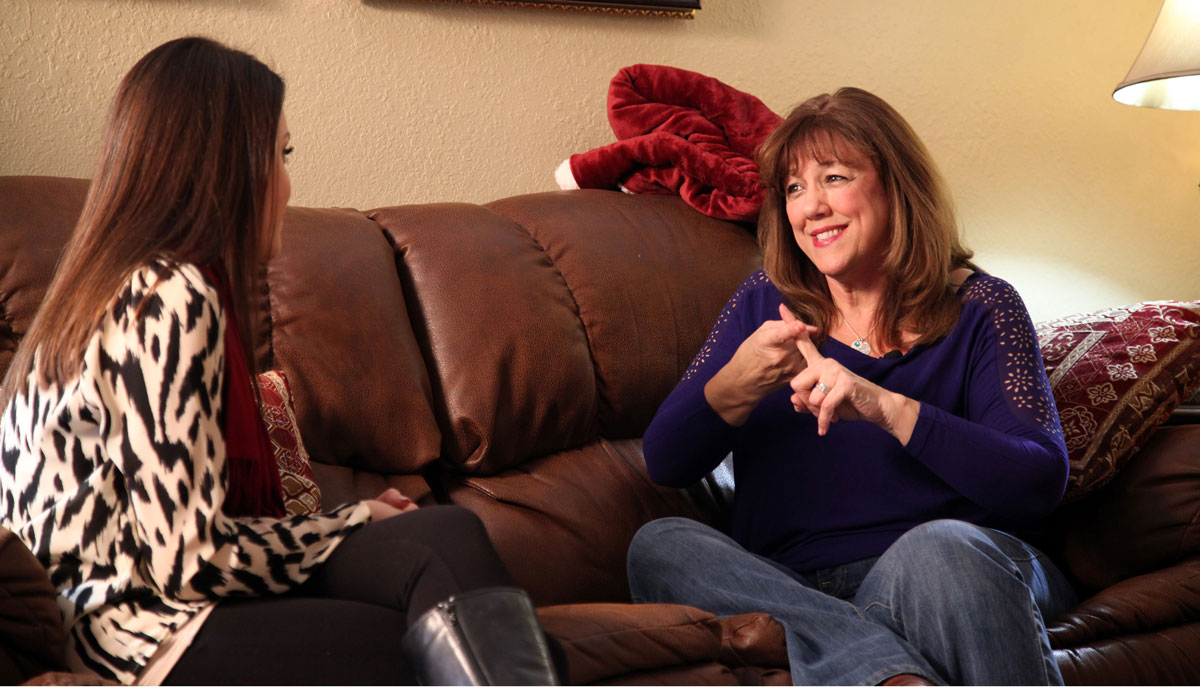Saving Lives
Thursday, November 5, 2015

Marie Guard credits her life to smoke alarm equipment designed for people whoare deaf or have hearing loss. Around a half-hour after OSU staffers and an American Sign Language interpreter installed a new smoke alarm, she was in the back office of her home on the video relay phone, visiting with her husband.
"I looked, and I could see the strobe light way down the hall,” says the Broken Arrow, Oklahoma, resident.
Smoke alarms save lives by notifying people to a home fire through high-frequency tones But individuals with hearing loss can’t always hear the standard smoke alarms. The Oklahoma Assistive Technology Foundation (OkAT) received a grant from the U.S. Department of Homeland Security Federal Emergency Management Agency to install smoke alarms and alert equipment in the homes of individuals in Oklahoma who are deaf or hard of hearing. OkAT has partnered with Oklahoma ABLE Tech, Fire Protection Publications, and Fire Service Training (all located at Oklahoma State University) to install free smoke alarms and alert equipment for those who are deaf or have hearing loss.
Guard says she thought the equipment was malfunctioning — until she found smoke in her living room. In the kitchen, a towel that was left too close to a burner was smoldering.
Guard says she had started to melt chocolate on the stove for candy, then thought she turned off the burner and left the kitchen to call her husband to tell him about the new smoke alarms. She never meant to test it out so soon.
“No one was hurt, just my pride a little bit,” she says. "There was no smoke smell in the office, and this could have continued and become a real dangerous fire."
After her experience, Guard wants other people to know about the alarms. She teaches children who are deaf in the Tulsa schools system, and she provided each of her students with an application for the program. She included a letter about her experience to encourage others to apply. After Guard’s smoke alarms were installed and put to the test, two television channels in Tulsa highlighted the program in their newscasts, prompting many to apply for the equipment.
Guard said that many of these things were not available to the hearing impaired when she was growing up.
“As a matter of fact, when I became deaf, there was not even closed captioning on the television," she says. “But much has changed, and the lifesaving alarms installed in my home were free, thanks to Oklahoma State University.”
The program includes the installation of smoke alarms and alert equipment that include a bed shaker and a very loud, low-frequency bedside alarm that has a strobe light as well. Trained fire safety professionals also provide household members with a customized home fire escape plan and information to prevent home fires, burns, falls and other common home mishaps. The equipment is provided at no cost.
Guard’s case is one of nearly two dozen documented since the program started at OSU. Those working to promote the program support its cause and are working to tell others how important this technology can be.
“Fire is hotter and faster in today’s homes,” says Nancy Trench, program director. “When a smoke detector sounds the alarm, escape time is as little as three minutes.”
She encourages each home to have plenty of smoke alarms and a home fire drill.
Anyone who is hearing impaired or deaf in Oklahoma is eligible for the program.Applications are available at www.okabletech.okstate.edu or by calling Tammie Honeyman at Oklahoma ABLE Tech (toll free) 888-885-5588 or email tammie.honeyman@okstate.edu. Equipment is available while supplies last. Applicants must provide proof of a hearing loss with the completed application.
